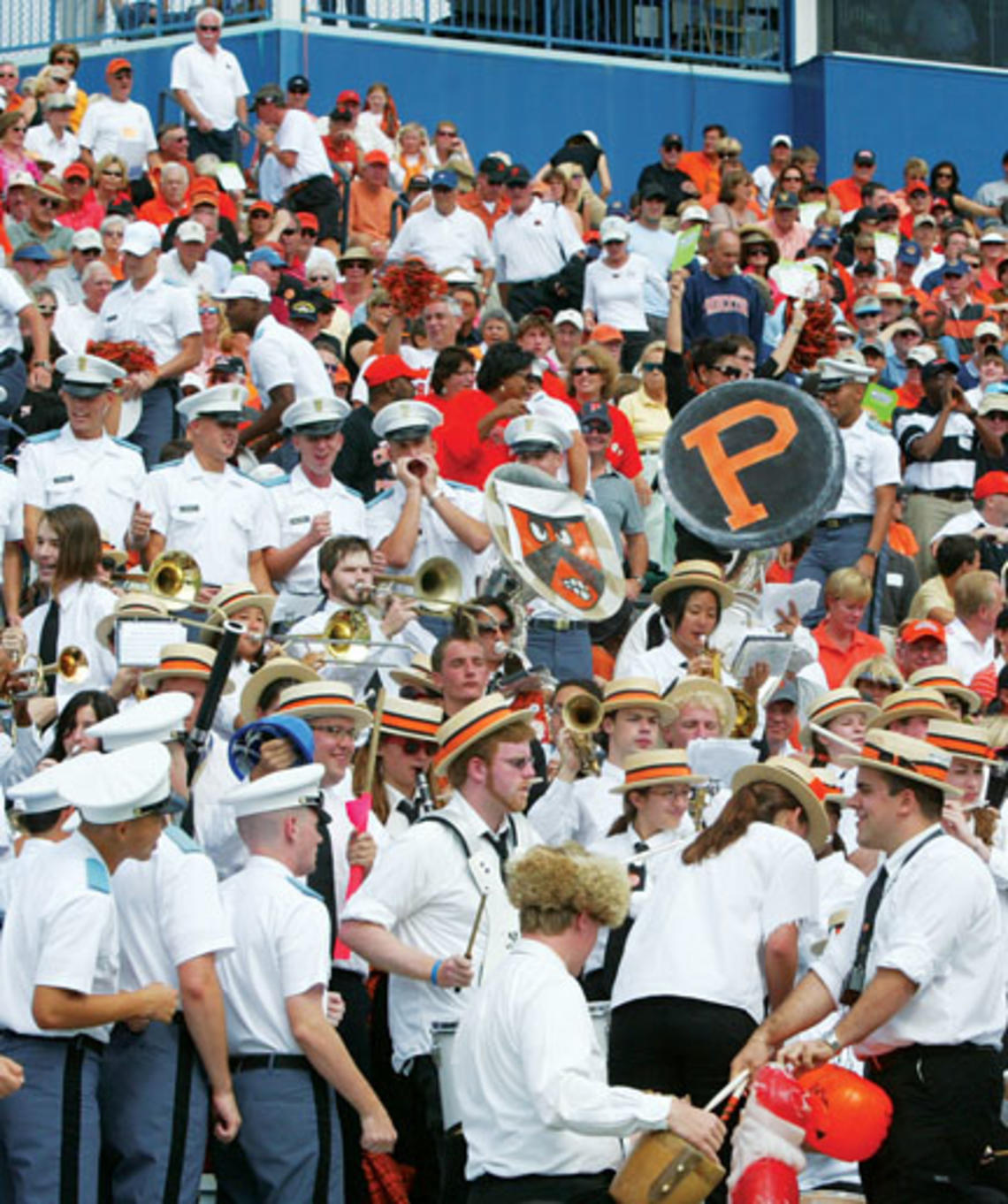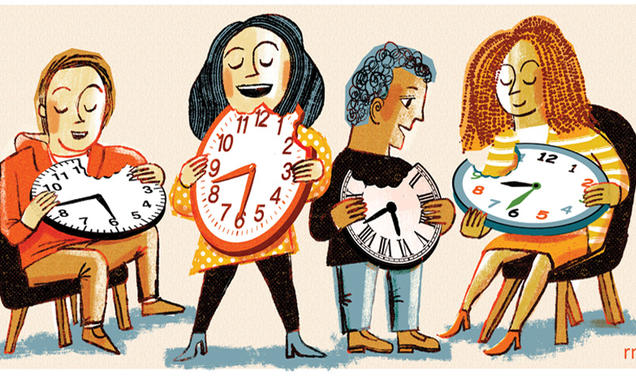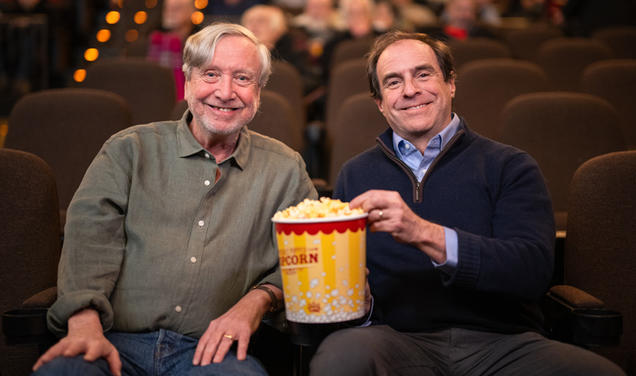Band’s visit to The Citadel draws a frosty reception
Altercation, cadets’ hostile reaction to halftime show seen as evidence of ‘culture war’ between the schools

The Princeton University Band has a long-standing tradition of provocative antics, but cadets at The Citadel, where the Tigers played Sept. 20 for the first time, didn’t think the jokes were funny. Instead of laughs, the band was at the center of several tense encounters and suggestions of a “culture war” between the two schools.
The first incident occurred shortly after the band entered The Citadel’s campus Saturday morning. According to band member and drill master Daniel Jaffe ’10, after a group of cadets tried to block the band’s path, the band attempted to respond to the tense situation with humor, and Jaffe called a scramble, with the 43 band members breaking formation. The cadets then began spitting at female band members, roughing up some of the male members, and breaking one band member’s clarinet as he was pushed to the ground, said band president Alex Barnard ’09.
“We had no indication of why we were being attacked at the time,” Barnard said. “We were told only later that the area on which we were marching was a part of campus that is revered.” While the march had been approved by Citadel administrators, the band later discovered that the route it had been marching along was the Avenue of Remembrance, a campus street that honors The Citadel’s fallen alumni.
Jaffe said that after witnessing this altercation, Air Force and Marine Corps administrators ordered the cadets to stand down, and the band was provided with an escort to continue its march around the campus.
Later in the day the action moved to the football stadium. With Princeton holding a 17–7 lead (Princeton ultimately lost), the band took the field for its halftime show, but the announcer was drowned out by nonstop boos and shouts. Hecklers in the 13,000-strong crowd screamed, “Go home, Prince-ton!” and “Homos!” A number of Citadel cadets said that they were offended by the band’s gestures. (Videos of the incident have made their way onto the YouTube video-sharing Web site.)
“Although we were concerned that our nontraditional style could be off-putting to those unfamiliar with it, The Citadel assured us that they were excited to have us,” Barnard said. “We worked collaboratively and at length with The Citadel to make sure our script met their approval.”
Barnard acknowledged that the band’s brand of humor could be misconstrued, and he apologized for “sexually suggestive acts performed by two members” during the halftime show. “These were not part of our script, not part of any typical band routine, and were completely inappropriate,” he said.
According to Barnard, when the band members returned to the stands after their performance, a group of about 20 cadets surrounded them and began screaming at them. Some band members were reduced to tears, and the cadets moved away only after police and higher-ranking officers intervened.
The events prompted an apology from The Citadel’s president, retired Air Force Lt. Gen. John W. Rosa, who said The Citadel “must hold cadets to a higher standard.”
“No one I have spoken to in the band can remember any instance previously in which the band has been subject to physical assault,” Barnard said in an e-mail. “Although band members are disappointed about the incident, we have moved on quickly.”
The incidents drew national news coverage after initial coverage in The Daily Princetonian and The Post and Courier of Charleston. A week after the Prince article was published it had attracted more than 575 comments on the newspaper’s Web site, the most ever. Postings and letters to the editor came both from Princetonians and from Citadel fans.
“The cadets’ sacred, honorable institution was invaded by ‘long-haired liberals’ banging on flamingos, so the cadets lashed out,” wrote Michael van Landingham ’08 of Charleston. “I don’t blame the Princeton University Band for what happened because it would have been impossible for it to understand The Citadel.”
Many letters supported the band, but the Charleston Post and Courier expressed a different view. “Heck, instead of a tongue lashing, the entire Corps of Cadets should be given a medal for standing up for their school,” wrote columnist Ken Burger. “The Princeton band, meanwhile, should be ashamed. All those pseudo-intellectuals and not a single brain among them.”
Princeton’s vice president of campus life, Janet Dickerson, suggested that the administration was disappointed about the events that took place at The Citadel and supported the Princeton band. She said senior Citadel administrators had “vetted and approved” the script of the band’s performance before the game. “We appreciate the importance of being sensitive to other institutions’ cultures and traditions, and that sensitivity continues to be communicated to all members of our community who interact with members of other campuses,” she added.
Both schools “could have done a better job of communicating with one another,” Citadel spokesman Lt. Jeffrey Perez said in an e-mail. “With the lessons learned, we all look forward to a great time when we play next year at Princeton,” Perez said.










9 Responses
John Brittain ’59
9 Years AgoA culture clash at every game
PAW’s article on the Princeton band incident at The Citadel (Notebook, Oct. 22) suggests that this resulted from a “clash of cultures.” I would like to suggest that we have a clash of cultures on our football field at every game.
O n the one hand, you have the culture of the football team: people playing hard for common goals – victory and pride, acting as a team in following accepted directions for action, behavior, and common identify.
On the other hand, you have the culture of the band: a group of individuals, each of whom is trying to prove his or her identity by various forms of sloppy dress, personal “antics,” and embarrassing, infantile attempts to be funny.
Any visitor to this scene could justifiably walk away wondering, “Which is the real Princeton?”
Reed M. Benet ’84
9 Years AgoCitadel game questions
I’ve never been a big fan of the Princeton band, nor any of the other so-called “scramble bands” around the country. I do believe I get their fundamental inherent joke, though, which is to utilize and stretch the tradition (read: license) of the halftime show as an opportunity to mock the opposing students and institution, mock the fans on both sides if they take the game of football too seriously, and even for the band members to mock themselves.
Scramble bands are at their least no longer freshly provocative as when they were founded as reactions to the constrained and often hypocritical society, institutions, politics, and traditions prior to the 1960–70s. Furthermore, the honor of serving nearly five years as a USMC infantry officer taught me a life lesson or two, such as that it is probably highly inadvisable for any outside band to march across The Citadel campus delivering — or on the way to deliver to that institution and its students — mockery.
And opposed to my fellow Princeton commentators on this matter, I believe that The Citadel students showed an element of restraint as compared to what could have happened. The Princeton band’s march, even if allowed by senior leadership at The Citadel, showed a complete ignorance of the concept of home turf. Many of The Citadel students involved soon are going to be deployed as military officers in harm’s way. And the odds are, unfortunately, that a few of them may even die for turf in Afghanistan and Iraq.
Both football and the military are physically and mentally all about controlling turf and controlled violence. I suggest that the members of the Princeton football team be asked whether they want the band accompanying them to away games. For it is on their blood, sweat, and often even tears that the band and its spirit of mockery ride.
Richard Daily ’54
9 Years AgoKeep playing Citadel
I read with great interest Reed Benet ’84’s letter about the Citadel football game (Dec. 17). My wife and I, as well, attended the game and agree wholeheartedly with Reed. Perhaps being an ex-Naval officer, with one of my grandsons attending West Point, makes me better appreciate military traditions and the importance they represent to the attendees. Although it was unfortunate that several of The Citadel cadets let their emotions get the best of them, for which I feel certain The Citadel administration has made them pay, our band’s behavior both before and during the game showed a complete lack of respect for the institution they were visiting. One of the several good reasons I chose Princeton resulted from watching one of my older brothers, Class of ’43, march in a traditional Princeton band during football games.
I’m concerned that several alumni seem to place most of the blame on The Citadel and feel we should no longer schedule them as an opponent. Malarkey! The game was a fantastic game to watch, a credit to both Coach Roger Hughes and the football players. I am one who hopes lessons have been learned on both sides and the competition will continue.
Gary Oleson ’71
9 Years AgoAccepting a non-apology
Richard Daily ’54’s letter (Feb. 11) added one more round of “blame the victim” in the cadet assault on the Princeton band before the Citadel football game. He is “certain” that the Citadel administration made the perpetrators “pay.” However, one of the perpetrators of the assault boasted online that not only had there been no disciplinary action, but they had been praised for their school spirit and given privileges. Other Citadel cadets threatened violence when they come to Princeton this year if they detect any disrespect. Care to make any bets on them detecting disrespect?
I’ve read that The Citadel’s president, Lt. Gen. John Rosa, apologized for his cadets. This is another falsehood. My dictionary lists three elements of an apology: an acknowledgement of some fault, injury, or insult; an expression of regret; and a plea for pardon. Gen. Rosa’s statement contained none of these. Instead, he appreciated the cadets’ “enthusiasm” during a “heated exchange” and spoke vaguely of using the episode as a “learning experience” without specifying what behaviors were to be favored or avoided.
Gen. Rosa’s statement and lack of action are more disturbing than the hotheaded actions of his cadets. He delivered a message in bureaucrat-speak that his cadets are free to assault Princeton students with no adverse consequence. By accepting his non-apology as an apology, Princeton sends the message that it is willing to accept assaults on our students without protest.
Is football the right tool to bridge the cultural gulf between abuser and abused?
William J. Ledger ’54
9 Years AgoWhen the Citadel comes to Princeton
The PAW description of the undisciplined behavior of members of the Corps of The Citadel toward our band members, both on campus and in their home stadium, raises the question of what to expect next fall when these two schools are scheduled to meet on the Princeton gridiron. If these cadets could not be controlled in South Carolina, should we expect better behavior in New Jersey?
I think Princeton has three options, and list them in my order of preference:
1. Cancel the game. For me, this is not a rivalry to foster.
2. Play the game, with the proviso that neither The Citadel band nor the Corps should attend.
3. Play the game, appealing to The Citadel’s administration to maintain control. If the third option is taken, I, for one, will not attend the game. I don’t want to be privy to uncivilized behavior off the field.
What happened in Charleston was a serious breach of sportsmanship and should be treated as such.
Bill Adams ’53
9 Years AgoWhy play the Citadel at all?
The band’s unfortunate experience at The Citadel prompts this question: With so few non-Ivy dates available, why does football schedule the likes of San Diego, Hampton, and, now, The Citadel, in the first place? In addition to Colgate, Lafayette, and Lehigh, regular non-league foes, there are a number of other, much closer schools of compatible athletic and academic stature (Bucknell, Fordham, Holy Cross, Towson, and Villanova, to name a few).
It makes more sense to play distant teams in basketball, where, in a longer schedule, two or three games occur on the same trip and, cost-wise, involve only a fraction of the personnel.
Scott Yost *87
9 Years Ago‘Provocative antics’
Robert Wright ’97
9 Years AgoProud of the band's behavior
Thomas G. Meeker ’56
9 Years AgoAppreciating the band